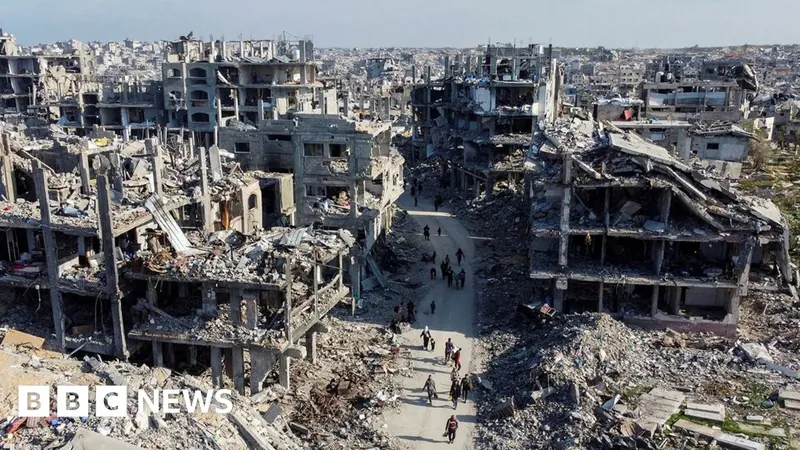
Rebuilding Gaza: A Long and Challenging Journey Ahead, Warns UN Official
2025-01-20
Author: Wei
Rebuilding Gaza: A Long and Challenging Journey Ahead
The daunting task of reconstructing Gaza following extensive devastation will require "an awful lot of time," a United Nations official has stated, emphasizing that the needs extend far beyond mere food and shelter. Sam Rose, the acting director of the UN agency for Palestinian refugees (UNRWA) in Gaza, highlighted the necessity of healing communities and restoring social fabric, not just physical infrastructure.
Since a ceasefire and hostage release agreement between Israel and Hamas took effect on Sunday, over 630 aid lorries have entered Gaza, delivering critical supplies such as food, tents, blankets, mattresses, and winter clothing that had been trapped outside the territory for months. The terms of the ceasefire stipulate that 600 aid lorries, including 50 with fuel, are expected to be permitted daily within the first six weeks, coinciding with Hamas's commitment to release 33 Israeli hostages in exchange for hundreds of Palestinian prisoners.
Rose noted that with the cessation of hostilities, UNRWA can more effectively coordinate aid deliveries without the constraints imposed by an active conflict zone. He reported no significant incidents of looting or violence during this initial phase, yet he stressed that the well-being of the people of Gaza cannot solely be measured by the quantity of aid received. "Every person in Gaza has been traumatized by what has transpired. Most homes and roads are destroyed, indicating that the rebuilding process will be extensive," he remarked.
In parallel, the World Health Organization (WHO) revealed a 60-day initiative aimed at revitalizing the healthcare system in Gaza, which has suffered catastrophic damage. Half of the hospitals remain out of service, and efforts will include setting up temporary clinics in the most affected areas, addressing malnutrition, and controlling outbreaks of disease.
UN humanitarian chief Tom Fletcher emphasized that the humanitarian needs in Gaza are "staggering." Reports indicate that Israeli military restrictions, coupled with the chaos of ongoing conflict, have exacerbated the crisis. While Israel claims that aid deliveries are unrestricted and blames UN agencies for inefficient distribution, it also accuses Hamas of diverting aid—allegations that Hamas denies.
Since the launch of the Israeli military campaign against Hamas following a deadly cross-border attack on October 7, in which approximately 1,200 people were killed and 251 taken hostage, the toll has been devastating. The Hamas-run health ministry reports that over 47,000 people have died and more than 111,000 have been injured in Gaza. Most of the 2.3 million residents have faced multiple displacements, with around 60% of buildings reported as damaged or destroyed. Essential services such as healthcare, sanitation, and access to clean water are in shambles, leading to dire shortages of food, fuel, medicine, and adequate shelter.
A disturbing trend concerning food security has emerged, with the UN-backed Integrated Food Security Phase Classification (IPC) estimating that 1.84 million residents are experiencing high levels of acute food insecurity, with 133,000 facing catastrophic levels. An IPC committee warned that certain northern areas of Gaza are on the brink of famine. Before the ceasefire, northern towns like Jabalia, Beit Lahia, and Beit Hanoun had been largely isolated from food assistance as the Israeli ground offensive aimed to neutralize Hamas escalated.
A heart-wrenching account came from a Palestinian woman, Manal Abu al-Dragham, who returned to her ravaged home in northern Gaza, describing the devastation as reminiscent of an earthquake. "I will set up my tent in the north no matter what it costs... I do not want to be displaced from my land again," she stated, underlining the resilience of the Gazan people amidst unprecedented adversity.
UNRWA, the largest humanitarian organization in Gaza, finds itself at a crossroads, facing potential restrictions from Israeli authorities that could undermine its operations. Two new laws passed by the Israeli parliament could significantly hinder UNRWA’s ability to function in the territory. Despite these challenges, UNRWA's commissioner general, Philippe Lazzarini, affirmed the agency’s commitment to remain operational, with staff ready to provide vital assistance despite potential personal risks.
As Gaza begins the long journey toward recovery, the international community watches closely, bearing witness to the resilience and suffering of its people and the immense challenges ahead in rebuilding not just structures, but lives and communities ravaged by conflict. The question remains: how long will it truly take to restore hope and stability to a region seeking solace amid devastation?




 Brasil (PT)
Brasil (PT)
 Canada (EN)
Canada (EN)
 Chile (ES)
Chile (ES)
 Česko (CS)
Česko (CS)
 대한민국 (KO)
대한민국 (KO)
 España (ES)
España (ES)
 France (FR)
France (FR)
 Hong Kong (EN)
Hong Kong (EN)
 Italia (IT)
Italia (IT)
 日本 (JA)
日本 (JA)
 Magyarország (HU)
Magyarország (HU)
 Norge (NO)
Norge (NO)
 Polska (PL)
Polska (PL)
 Schweiz (DE)
Schweiz (DE)
 Singapore (EN)
Singapore (EN)
 Sverige (SV)
Sverige (SV)
 Suomi (FI)
Suomi (FI)
 Türkiye (TR)
Türkiye (TR)
 الإمارات العربية المتحدة (AR)
الإمارات العربية المتحدة (AR)